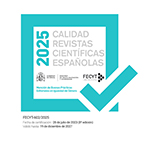Funcionamiento y viabilidad de las alianzas de fact-checking en España: el caso de Comprobado
Resumen
El surgimiento de la alianza Comprobado en periodo electoral es un ejemplo paradigmático en España de iniciativas de fact-checking colaborativo. Mediante entrevistas semiestructuradas a miembros de las plataformas de verificación integrantes (n = 5), esta investigación estudia las dinámicas establecidas en la reedición de Comprobado para las elecciones generales en España de 2023. El objetivo de esta investigación tiene una dimensión doble: en primer lugar, examinar el funcionamiento y la viabilidad de la alianza, teniendo en cuenta las dinámicas de trabajo diversas que sus procesos periodísticos exigen a las agencias de verificación y a los medios de comunicación integrantes, así como las diferentes formas de actuación que siguen las entidades de fact-checking; y, en segundo lugar, elaborar, a partir de los resultados, un decálogo de buenas prácticas como método de evaluación y mejora de estas iniciativas. Los resultados demuestran la necesidad y el beneficio de contar con un actor encargado de la coordinación, además de poseer materiales de uso comunitario como una base de datos con contenidos desinformativos, una escala de medición común, y un marco de políticas de compartición de verificaciones con los medios de comunicación adheridos. El estudio concluye que el funcionamiento de la reedición de Comprobado es generalmente positivo, aunque hay margen de mejora en determinadas áreas de trabajo, como, por ejemplo, en la medición posterior del impacto de la iniciativa. Asimismo, en países como España, con redacciones tensionadas y un entorno mediático pluralista polarizado, las alianzas de tipología cross-sharing se presentan como la opción más viable y eficiente.
Descargas
Descarga artículo
Licencia
La revista Estudios sobre el Mensaje Periodístico, para fomentar el intercambio global del conocimiento, facilita el acceso sin restricciones a sus contenidos desde el momento de su publicación en la presente edición electrónica, y por eso es una revista de acceso abierto. Los originales publicados en esta revista son propiedad de la Universidad Complutense de Madrid y es obligatorio citar su procedencia en cualquier reproducción total o parcial. Todos los contenidos se distribuyen bajo una licencia de uso y distribución Creative Commons Reconocimiento 4.0 (CC BY 4.0). Esta circunstancia ha de hacerse constar expresamente de esta forma cuando sea necesario. Puede consultar la versión informativa y el texto legal de la licencia.










